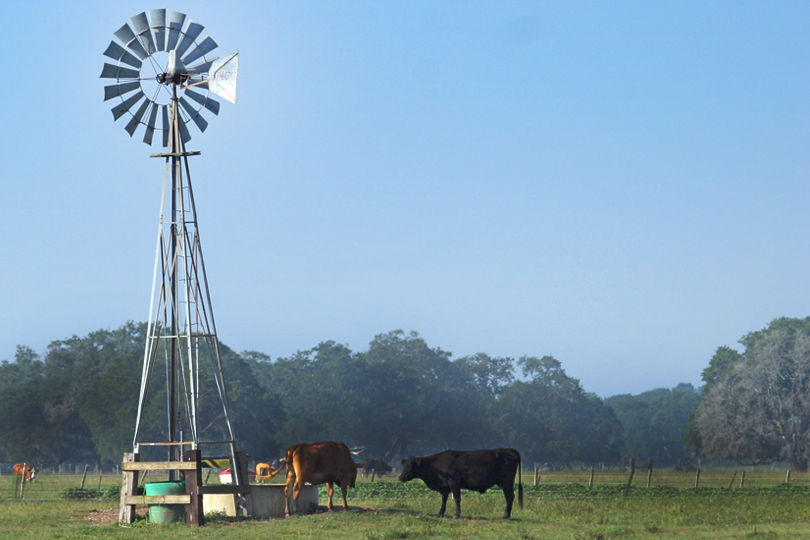By Jennifer Dorsett
Field Editor
Brazos County landowner Anthony Fazzino recently won an appeal in a suit against the Brazos Valley Groundwater Conservation District, sending the federal case back to trial.
At its heart, the case is about groundwater ownership and a local groundwater district’s ability to be taken to court.
The U.S. Fifth Circuit Court of Appeals‘ ruling is a key victory for Texas landowners in the ongoing battle for strengthening private property rights, according to Texas Farm Bureau (TFB) Director of Government Affairs Regan Beck.
In the original case filed in 2017, Fazzino alleged the district permitted the City of Bryan to drill a new well, Well No. 18, on land adjacent to his property but denied him the same ability to do so on his own property, amounting to an illegal taking of his property.
But the district judge of a federal court in Waco dismissed Fazzino’s case under the premises the groundwater district is equal in status to a state agency, and therefore, protected under the 11th Amendment from being sued.
In 2019, TFB filed an amicus curiae brief in Fazzino’s appeal, noting several flaws in the initial judge’s decision to dismiss the case.
“TFB’s interest in this case centers upon clearly established property rights,” Beck said. “Groundwater ownership is well-settled in Texas. If a person’s neighbor is pumping a certain amount of water from below the ground, that person has the legal right to do the same thing. The groundwater conservation district attempted to prevent Mr. Fazzino from doing so, which is an attempt to suppress his property rights as a private landowner while letting a municipality play by a different set of rules. And when he tried to bring them to court to correct the situation, the court said they were protected from lawsuits because they’re a state agency, and that’s just not the case.”
The permit issued by the groundwater district allowed the city to produce groundwater at 3,000 gallons per minute and 4,838 acre-feet of groundwater per year on a 2.7-acre parcel of land. The city’s well is located within 3,000 feet of Fazzino’s 26-acre property.
To offset the production from Well No. 18, which had the effect of draining water from under Fazzino’s property, he applied for a drilling and operating permit for a new well of his own, seeking the same production rate the groundwater district permitted for Well No. 18.
But Fazzino’s application was denied. And when David Stratta, a board member of the Brazos Valley Groundwater Conservation District, attempted to bring up the permitting issue at a board meeting, his fellow directors refused to discuss it.
Stratta, an active TFB leader and fellow landowner, felt the rejection of Fazzino’s permit was unfair. In denying the permit, the groundwater district told Fazzino he would need 649 acres of land to attain a production rate of 3,000 gallons per minute, despite allowing the city’s well the same rate on far less land.
Later, Stratta joined Fazzino’s appeal after the district court threw out the case.
Fazzino was only asking for what he is guaranteed under the Texas constitution: The right to produce a fair share of the groundwater under his land in the same manner, and under the same application of rules, as his neighbor, Beck said.
“He isn’t seeking any new groundwater rights or asking for a greater amount of that property right than his neighbor, which in this case was a municipality,” he said. “Instead, he realized the neighbor was pumping a far greater amount of groundwater out from under him, and when he sought to remedy the situation by installing his own well, the groundwater district denied him the ability to do so, which absolutely goes against everything private property rights stand for.”
The groundwater district’s treatment of Fazzino, in contrast to its permitting treatment of the City of Bryan, presents both unequal protection and takings of property issues.
The unequal application of rules has prevented Fazzino’s effort to produce his fair share of the groundwater under his property, Beck noted. The initial decision that the groundwater district was immune from lawsuits was an incorrect interpretation of the 11th Amendment.
In May, the three-judge panel of the Fifth Circuit agreed.
They reversed the district court’s decision, saying a Texas groundwater district is not immune from suit under the 11th Amendment, because the groundwater district does not have statewide jurisdiction and is not an “arm of the state.” The court also stated the Texas Supreme Court has recognized groundwater is a property interest entitled to protection, allowing plaintiffs to seek compensation for takings violations by way of a federal lawsuit.
“This is a big deal and a huge win for Texas landowners,” Beck said. “Otherwise, a person who had a disagreement with a groundwater conservation district can’t get their day in court. Water is a precious natural resource that any farmer, rancher or private landowner rightfully wants to protect from being taken, so we’re glad to see the court uphold those rights and verify that a person can sue a local district that’s acting unfairly.”


Ban the water Districts. They can get out of control. They aren’t needed in East Tx at all.. Just a Tax Payer Burden.